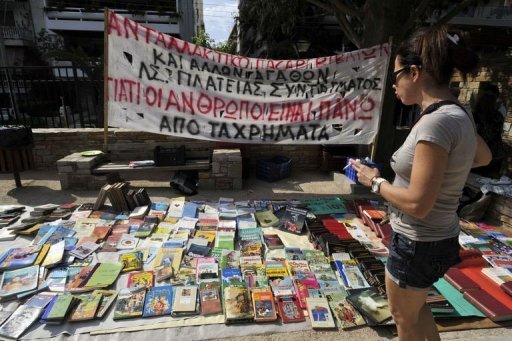As a computer specialist who can fix your PC, Vassilis Revelas has a valuable skill. In Greece’s economic crisis, he’s found a new way of using its value — without a single euro changing hands.
Like hundreds of others in Greece, where incomes have plunged in four years of recession, he uses the time bank — an online exchange where members swap services, counting the cost not in euros, but in hours.
“I racked up about 10 hours of work by fixing people’s computers,” says Vassilis.
“In return I’ve had an electrician come to help with my phone line, I’ve had someone do my hair, I had someone help me move house and I also had Spanish lessons,” he told AFP.
Time-banking and other forms of bartering are on the rise in Greece and other crisis-hit countries such as Spain, as people come to grips with lower salaries, pensions and job prospects.
“There were time banks before, but people didn’t know about them. They didn’t need to,” says another user, Christine Papadopoulou. “The reason people know about us now is because of the crisis.”
She says more than 1,000 people are registered on the Athens time bank, of which around 200 active members regularly use it to give and receive services.
“I went to the house of a girl I didn’t know and helped her organise her closet,” says Christine, 33, an event planner. “Her house was very messy so I helped her to organise the space.”
This earned Christine three hours of credit, which the person she helped logged for her on the time bank website.
Originally an anti-capitalist initiative, like many of the free bartering markets that have sprung up in Greece, the time bank does not let market forces set the value of members’ labour.
“We believe that we are all equal — one hour of a doctor’s time is equal to the hour of a cleaning lady,” says Christine. “Right now we only have two doctors” in the bank.
“It is a way for people to get what they need when the economic system is failing them,” Vassilis adds. “On the other hand it raises very important questions about how the capitalist system works.”
At an open-air bazaar in Halandri, a north Athens suburb, punters try on shoes, play with toys and walk away with piles of books or bags of clothing brought there by their fellow locals — without paying a penny.
“This is happening everywhere where people are poor and need it. It’s happening in most of the cities,” says local musician Kostas Kousis, 35, one of the organisers.
“We’re doing a lot of things like this, and sharing food. Someone who has a lot of rice can exchange it for fruit or meat. This was happening before also, but now it’s more necessary,” he adds.
“We’re trying to explain to the people that they can avoid money.”
Greece’s financial problems have driven speculation that it may drop the euro and return to the weaker drachma. Leaders and companies are reportedly preparing for the country’s possible eurozone exit.
Advocates of bartering insist it is not about replacing currency. Many Greeks reject the recent currency fears as hype generated outside Greece.
“I don’t think we’re going to stop using the euro. They’re trying to scare us into submission,” says Despina Tzeveleki, 31, who brings a box of her childhood Barbie dolls to the Halandri barter fair. All the dolls but one get taken.
“It wouldn’t be easy to change to the drachma,” says Despina, who lives with her parents off her father’s pension which has been cut by a third.
“It would have a big impact on the economy of Europe and maybe on other countries as well.”
Users of bartering say it helps them pull together through a crisis they say they did not create. Weary of tales of corruption among politicians, many Greeks complain of how the economy has been managed.
“These bazaars were started by people in environmental associations. Then the economic crisis came, so they have a more social function as well,” says Katerina, a participant in the bazaar who would not give her second name.
“I don’t think this can be large-scale,” she adds, however. “I don’t believe in the organisation skills of the Greeks. You have to have self-discipline to do it. But it’s not the people’s fault.”
Kostandin Leka, a blue-eyed Albanian immigrant of 39, approaches the Halandri market with his four-year-old son.
Working as a glazier, he had his pay cut last year from 1,000 to 650 euros a month. Two thirds of that goes on rent.
At the free bazaar he finds a box of dominos for his boy to play with and a bracelet to take home for his wife.
“No money,” he explains.

COMMENTS
Please let us know if you're having issues with commenting.